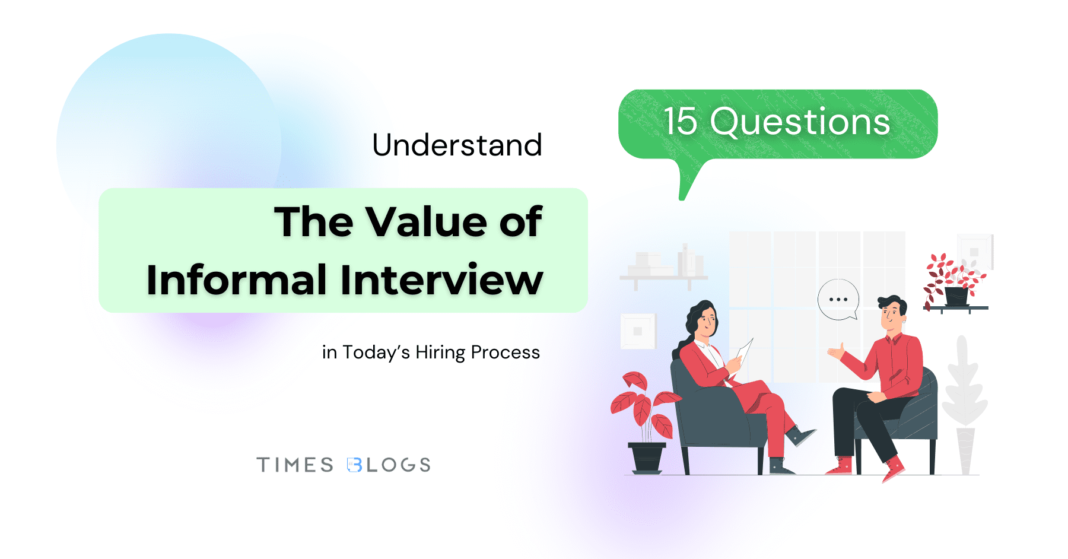In today’s rapidly shifting recruitment landscape, capturing the heart and soul of a candidate goes beyond scanning a CV or hearing rehearsed answers. The true challenge for hiring managers lies in peeling back the layers, unveiling the essence that resides beneath the surface.
Informal interview questions have emerged as a beacon in this quest. Unlike the routine inquiries we’ve grown accustomed to, these unconventional questions are in a league of their own. They delve deeper, revealing insights into a candidate’s intrinsic personality traits and their deeply held values.
Furthermore, these questions unearth the natural instincts a candidate might bring into problem-solving scenarios. In this comprehensive exploration, we’ll embark on a journey. A journey aimed at uncovering the transformative potential of these questions and understanding their pivotal role in redefining the art and science of modern recruitment.
Table of Contents
Informal Interview: A New Dawn in Recruitment
In the constantly evolving landscape of corporate recruitment, the role of informal interview questions has come to the fore. No longer are interviews mere formal exchanges, tethered to the same set of predictable queries. Instead, informal interview questions are breathing new life into the process, encouraging genuine conversations and richer connections.
What distinguishes informal interview questions? It’s not just about creating a relaxed atmosphere. It’s about the element of spontaneity and the unexpected insights they can bring. While traditional interviews focus on a candidate’s skills and experiences, informal interview questions delve deeper, seeking to uncover adaptability, creativity, and a genuine alignment with the company’s ethos.
The shift towards these informal interview questions isn’t a mere fad. It’s a response to the needs of a modern workplace, which seeks to understand not just what a candidate knows, but how they think and who they truly are. Through these unscripted, unconventional queries, recruiters and hiring managers have a new toolkit to gauge the nuances that make each candidate unique.

What are Informal Interview Questions?
In the expansive world of recruitment and talent acquisition, interviews are a key component. Traditionally, these interviews are structured, following a set pattern of questions that have been used for decades. However, as the corporate world has evolved, so has the art of interviewing. This evolution has birthed a new kind of questioning technique: the informal interview questions. Let’s delve deeper into understanding these.
Definition and Overview
Informal interview questions can be defined as those that don’t necessarily align with the standard set of questions that interviewers typically ask. They aren’t directly related to the job’s technical requirements or the qualifications mentioned in a CV. Instead, they focus on the candidate as an individual, their perspectives, values, creativity, and how they react to unexpected situations.
Nature and Characteristics
- Unpredictability: These questions are often unexpected. They catch the interviewee off-guard, pushing them out of their rehearsed comfort zones.
- Open-ended: Informal questions usually don’t have right or wrong answers. They’re designed to be open-ended, allowing candidates to showcase their thought processes and personality.
- Personal Touch: These questions often touch upon personal interests, hobbies, values, and experiences that aren’t necessarily mentioned in the resume.
Examples
To give a clearer picture, here are some examples of informal interview questions:
- “If you could be a superhero, who would you be and why?”
- “What’s the last book you read and how did it impact you?”
- “If you were stranded on a deserted island and could have three items with you, what would they be?”
Purpose and Aim
The primary goal behind informal interview questions is not to trip up the candidate but to understand them better. It offers interviewers a window into:
- Genuine Responses: Bypassing the rehearsed answers, these questions tend to extract more genuine and spontaneous reactions from candidates.
- Problem-solving and Creativity: Some questions are designed to understand how creatively a candidate thinks and how they approach unexpected challenges.
- Cultural Fit: These questions can offer insights into whether a candidate’s personal values and character align with the company’s culture.
In essence, informal interview questions are a fresh take on the age-old interviewing technique, bringing a new dimension to the hiring process. They allow companies to look beyond qualifications on paper, diving into the persona, character, and intrinsic qualities of an individual. In today’s rapidly evolving corporate ecosystem, where cultural fit and soft skills are becoming increasingly important, these questions play an essential role in finding the right talent.
The Rise of Informal Interview in Modern Hiring
As industries evolve and workplace dynamics shift, the parameters defining an ideal candidate have expanded beyond mere technical qualifications and experience. The modern hiring landscape has seen a growing emphasis on ‘fit’ – not just in terms of skill set, but in personality, values, and adaptability. This has led to the rising prominence of informal interview questions in the hiring process. Here’s a deeper look into their ascent:
Changing Workplace Dynamics
- Holistic Candidate Evaluation: Today’s companies recognize the importance of a well-rounded candidate. Beyond technical acumen, factors like emotional intelligence, interpersonal skills, and cultural fit have become increasingly significant. Informal questions allow interviewers to gauge these intangible qualities.
- Emphasis on Soft Skills: With the surge of automation and artificial intelligence, the technical aspects of many jobs are becoming automated. This has elevated the importance of soft skills such as creativity, teamwork, adaptability, and problem-solving. Informal interview questions provide a platform to assess these competencies.
- Innovative Start-up Culture: The rise of start-ups and their unconventional work environments have necessitated a different approach to hiring. Such environments value innovation, adaptability, and a strong cultural fit, and informal interview questions can be particularly revealing in these areas.
Benefits of Assessing Cultural Fit
- Aligning Values and Vision: Companies are more than their products or services; they are defined by their culture, mission, and values. Informal questions can help discern whether a candidate resonates with the company’s ethos.
- Team Dynamics: Collaborative roles especially require a seamless integration of new members. By understanding a candidate’s personality and how they might fit into existing team dynamics, employers can make more informed decisions.
Response to Traditional Question Limitations
- Bypassing Canned Responses: Traditional interview questions, due to their ubiquity, often elicit rehearsed responses. Informal questions, being unpredictable, fetch more spontaneous and genuine answers.
- Understanding Thinking Patterns: Questions like “How would you describe the color yellow to someone blind?” don’t have set answers but reveal a lot about a candidate’s creativity and perspective.
A More Relaxed Interview Atmosphere
- Breaking the Ice: Starting an interview with an informal question can help ease nerves, setting a more relaxed tone for the rest of the conversation.
- Building Rapport: Such questions can help in establishing a connection between the interviewer and the interviewee, making the conversation flow more naturally.
The rise of informal interview questions in modern hiring is a direct response to the evolving nature of workplaces and the increasing value placed on soft skills and cultural fit. They serve as a testament to the recognition that the perfect candidate is not just about the right skills but also the right mindset and personality. As organizations continue to innovate and adapt, informal interview questions will undoubtedly continue to shape and influence the future of recruitment.

The Hidden Value Behind Informal Interview Questions
While they may seem whimsical or even odd at times, informal interview questions pack a punch when it comes to the depth and breadth of insights they offer. They might be subtly posed, but the responses they elicit have the potential to shine a light on various facets of a candidate’s personality, thinking, and values. Here’s an exploration of the hidden value behind these questions:
A Gateway to Authenticity
- Beyond Rehearsals: Since informal questions are unpredictable, they’re less likely to be met with rehearsed answers. This spontaneity allows interviewers to get a glimpse of the genuine self of the candidate.
- Revealing True Personality: While professional experiences and qualifications are crucial, understanding who a candidate is outside their job role can offer invaluable insights into their true character and motivations.
Insights into Problem-Solving and Creativity
- Tackling the Unexpected: Questions that don’t have a straightforward answer can indicate how a candidate approaches unforeseen challenges. Their responses can shed light on their problem-solving techniques and adaptability.
- Innovative Thought Processes: Queries that demand creative thinking showcase a candidate’s ability to think laterally, offering insights into their innovation potential.
Stress Management and Composure
- Handling Curveballs: Observing how a candidate reacts to unexpected questions can be indicative of their stress management skills. Can they maintain their composure when thrown a curveball?
- Grace Under Pressure: Their ability to answer with poise, even if they find the question challenging, can be a testament to their resilience and grace under pressure.
Understanding Cultural and Team Fit
- Shared Values and Beliefs: Questions about personal experiences, beliefs, or hobbies can indicate if a candidate’s values align with the company’s culture.
- Team Dynamics: Understanding a candidate’s interpersonal skills, sense of humor, and general demeanor can be crucial in assessing how they would mesh with existing teams and company culture.
Highlighting Soft Skills
- Emotional Intelligence: How a candidate answers, the depth of introspection, and the empathy exhibited can be telling signs of their emotional intelligence.
- Communication Skills: Informal questions, especially those that demand storytelling or explaining complex ideas in simple terms, can highlight a candidate’s ability to communicate effectively.
In wrapping up, while the surface of informal interview questions might hint at triviality, the depth they can reach is profound. They’re not just about the answers but the thought processes, emotions, and values they unveil. In a world where the essence of a candidate is increasingly valued alongside their qualifications, the hidden potential of these questions is reshaping recruitment, bringing a more holistic, comprehensive approach to the hiring table.
Examples of Informal Interview Questions and Their Purposes
Informal interview questions, often termed as “offbeat” or “unconventional,” serve distinct purposes in the hiring process. These questions can be insightful, amusing, or thought-provoking, but they always aim to reveal more about a candidate than what’s on their resume. Let’s delve into some popular examples and understand the underlying motives behind posing them:
1. If you were a brand, which one would you be and why?
- Purpose: This question provides an avenue for candidates to express personal and professional aspirations. When they align themselves with a specific brand, they’re indicating which brand values, missions, or public perceptions resonate with them. It can also shed light on how they see themselves within an organizational context. For instance, a candidate who identifies with a luxury brand may prioritize quality and exclusivity, while one aligning with a sustainable brand might prioritize ethical practices and environmental responsibility.
2. How would you describe the color blue to someone who’s blind?
- Purpose: Beyond testing empathy and creativity, this question is a unique way of assessing communication skills. It challenges the candidate to convey an abstract concept, which they understand but is unfamiliar to their audience, using analogies or sensory descriptions. Their approach can reveal their ability to make complex ideas accessible and their capability to connect with diverse audiences.
3. Tell me about a recent book you read and how it impacted you.
- Purpose: This question delves into a candidate’s continuous learning and self-development habits. The type of book they choose and the insights they draw from it can indicate their interests, analytical skills, and adaptability. For instance, someone who reads non-fiction related to their field may be keen on professional growth, while someone who reads diverse genres may have a broader perspective and curiosity about the world.
4. If you had to survive a zombie apocalypse, what three items would you take with you?
- Purpose: While this question may sound whimsical, it’s a creative way to gauge problem-solving skills and adaptability. The items a candidate chooses can provide insights into their survival instincts, practicality, and strategic thinking. For instance, someone who picks a weapon, a communication device, and a medical kit shows foresight, preparedness, and prioritization.
5. What’s the most recent app you’ve downloaded on your phone?
- Purpose: This question aims to understand a candidate’s engagement with technology and contemporary trends. The app they mention can offer a glimpse into their current priorities or interests. For instance, a productivity app might suggest they’re organized and goal-oriented, while a meditation app might indicate they value mindfulness and mental well-being.
6. If you could have dinner with any three people, dead or alive, who would they be?
- Purpose: This question seeks to uncover the influencers, historical figures, or personalities that inspire or intrigue the candidate. Their choices can hint at their values, intellectual interests, and motivations. For instance, choosing visionary leaders may suggest admiration for innovation and transformation, while picking figures from the arts might indicate a deep appreciation for creativity and expression.
7. Describe a situation where you had to use humor to diffuse a tense situation.
- Purpose: This is a potent way to assess a candidate’s interpersonal and communication skills. Through their narrative, hiring managers can discern their capacity to read the room, adapt their communication style, and use humor effectively as a conflict resolution tool. It also hints at their emotional intelligence and how they navigate challenging situations with colleagues or clients.
8. If you were given a million dollars to start a new business, what kind of business would it be?
- Purpose: This question digs into the entrepreneurial spirit of the candidate. It evaluates their vision, passion, and how they might allocate resources. Their answer can also reveal if they lean towards societal impact or innovative solutions. For instance, someone who suggests starting a non-profit for education shows a societal inclination, while another proposing a tech startup may prioritize innovation.
9. What song best describes your work ethic?
- Purpose: Music often encapsulates emotions, pace, and energy. This question aims to translate a candidate’s work style and motivation into the realm of music. Their song choice can illustrate if they approach tasks with vigor and dynamism or if they work with a calm, methodical rhythm. It provides an imaginative yet insightful lens into their work persona.
10. If you could be any fictional character, who would you choose?
- Purpose: Fictional characters are often archetypes with distinct personalities, strengths, and challenges. When a candidate aligns with a specific character, it offers a window into the traits they admire, the stories they resonate with, and the aspirations or challenges they identify with. For example, someone choosing a resilient character from literature may value perseverance and facing adversity head-on.
11. What hobby or skill have you picked up recently?
- Purpose: This inquiry shines a light on a candidate’s commitment to personal growth, curiosity, and adaptability. Someone constantly learning or trying new things might be more adaptable to changing work environments or open to fresh perspectives.
12. If you could instantly become an expert in something, what would it be?
- Purpose: This question delves into a candidate’s aspirations and areas of interest. Whether they lean toward a professional skill, a personal hobby, or a broad subject area, their response can indicate passion, curiosity, and ambition.
13. What’s the most challenging feedback you’ve ever received, and how did you address it?
- Purpose: A pivot from the traditional weakness question, this probes into a candidate’s self-awareness, resilience, and commitment to self-improvement. It also offers insight into their ability to handle constructive criticism.
14. How do you handle failures or setbacks?
- Purpose: Resilience and the ability to bounce back from adversity are crucial in dynamic work environments. This question seeks to understand a candidate’s coping mechanisms, learning attitude, and their approach to challenges.
15. If you had the opportunity to relive any day of your life, which day would it be and why?
- Purpose: This introspective question provides insight into the candidate’s values, significant life moments, and introspection capabilities. It also sheds light on their ability to recognize and cherish pivotal moments in their journey, be it personal or professional.
In short, these questions, while informal, are intricate tools designed to unveil deeper facets of a candidate’s persona. Each response adds another dimension to the picture, enabling a more holistic assessment of potential hires.

Implementing Informal Interview in Your Hiring Process
Incorporating informal interview questions into your recruitment methodology isn’t about merely sprinkling in some offbeat inquiries amidst the conventional ones. It’s a strategic move, demanding deliberate planning and execution. But how do you seamlessly weave in these informal interview questions without disrupting the rhythm of the interview? Let’s delve into the steps:
Set Clear Goals with Informal Interview Questions:
- Purpose: Begin with the end in mind. Why are you introducing these informal interview questions? Are you aiming to probe a candidate’s creativity, adaptability, or perhaps their cultural fit?
- Action Step: Tailor each informal question to meet a specific objective. This ensures the questions are purpose-driven and aren’t mere conversation fillers.
Cultivate a Relaxed Interview Atmosphere:
- Purpose: The unexpected nature of informal interview questions can, at times, catch candidates off-guard.
- Action Step: Initiate the interview with standard questions, gradually transitioning to the informal ones. Make it clear that these questions aim to foster genuine conversation, and there’s no “correct” answer.
Balance is Key:
- Purpose: While informal interview questions offer rich insights, traditional questions remain invaluable.
- Action Step: Intermingle traditional and informal questions for a balanced and comprehensive interview experience.
Empower Your Interviewers:
- Purpose: The effectiveness of informal interview questions largely hinges on the interviewer’s skill in posing them and interpreting the answers.
- Action Step: Organize workshops or training sessions. Equip interviewers with the nuances of using informal interview questions and gauging candidate responses.
Review, Reflect, and Refine:
- Purpose: As the hiring landscape shifts, the efficacy of certain informal interview questions may wane.
- Action Step: Periodically assess the relevance and impact of your informal questions. Seek feedback from both interviewers and candidates, refining your list to remain impactful.
Navigate Cultural and Personal Sensitivities:
- Purpose: Informal interview questions, though insightful, may occasionally border on personal or cultural areas.
- Action Step: Craft questions that are globally respectful and sensitive. Offer candidates the latitude to choose another question if any make them uncomfortable.
Integrating informal interview questions into your recruitment strategy is more than a trend; it’s an evolution in hiring wisdom. As the focus shifts from mere qualifications to a holistic understanding of candidates, these questions stand as pivotal tools. However, their true potential is realized only when they are implemented thoughtfully, respecting both the intent and the candidate’s perspective.
Challenges and Criticisms of Informal Interview Questions
While informal interview questions can offer unique insights, they are not without their drawbacks. Here are some challenges and criticisms associated with these questions:
- Potential for Bias: The casual nature of informal interview questions, while often seen as a refreshing break from traditional ones, can unintentionally introduce or reinforce biases. A seemingly innocent question about weekend hobbies might inadvertently favor candidates of certain socio-economic backgrounds or lifestyles.
- Cultural Sensitivities: With an increasingly globalized workforce, questions that seem common or innocuous in one culture might be perplexing or inappropriate in another. It’s essential to consider cultural references and nuances when framing these questions to ensure they don’t alienate or disadvantage certain candidates.
- Misinterpretation and Subjectivity: The open-ended nature of many informal questions leaves them open to wide interpretation. What one interviewer finds impressive, another might find irrelevant or even off-putting. This subjectivity can lead to inconsistencies in evaluations.
- Lack of Preparation: Candidates often come into interviews having prepared for standard industry or role-specific questions. Throwing in an informal question can sometimes feel like a curveball, potentially sidelining candidates who might excel in the role but were thrown off by the unexpected.
Recommendation: While incorporating informal interview questions can be insightful, it’s crucial to do so thoughtfully, ensuring that the process remains equitable and consistent.
Check out our career-related blogs:
- 15+ Essential Exit Interview Questions to Gain Employee Insights
- Cracking the Coding Interview: A Comprehensive Guide
- Top 10 In-Demand Skills for the Future Job Market
Case Studies: Success Stories of Companies Using Informal Interview Questions
The power of informal interview questions becomes evident when we look at how some of the world’s leading companies have integrated them into their hiring processes:
- Google: Known for its innovative hiring practices, Google has, in the past, asked questions like “How many golf balls can fit in a school bus?” While this might seem whimsical at first, it’s designed to evaluate a candidate’s problem-solving skills and creativity.
- Apple: Apple’s interview process, reflective of its ethos of thinking differently, has included questions like “If you were a pizza delivery man, how would you benefit from scissors?” Such questions aim to gauge lateral thinking and the ability to find utility in unrelated scenarios.
- Airbnb: Aligning with its mission of creating a world where anyone can belong, Airbnb’s interview questions often touch upon themes of diversity and community. One such question is, “What inspires you to travel?” This helps interviewers understand the candidate’s perspective on global experiences and cultural immersion.
- Zappos: This company, famous for its stellar customer service, looks for hires who fit into its unique company culture. Interviewees might be asked, “On a scale of 1 to 10, how weird are you?” This light-hearted question probes for cultural fit and individuality, core tenets of the Zappos ethos.
- Tesla: Always at the forefront of innovation, Tesla has been known to pose challenging questions that test the boundaries of a candidate’s thought process, like “How do you solve problems?” While it sounds straightforward, the company is looking for depth, creativity, and a systematic approach to challenges.
These companies, each a titan in its industry, recognize the value that informal interview questions can bring to the table. Through these unconventional inquiries, they’re able to tap into deeper layers of a candidate’s personality, thought process, and potential cultural fit.
Conclusion
Navigating the intricate maze of modern recruitment, one thing becomes abundantly clear: the rising significance of informal interview questions. These questions aren’t just a fresh twist on the traditional interview format; they represent a deeper paradigm shift. By allowing hiring managers to transcend rehearsed answers, they provide a window into a candidate’s true persona, revealing glimpses of their innate creativity, adaptability, and alignment with organizational values.
Yet, their relevance isn’t merely tied to their novelty. As global companies recalibrate their talent acquisition strategies, aligning them more closely with their unique corporate culture and objectives, these questions become paramount. They’re not just illuminating; they’re becoming essential tools in discerning the subtleties that make each candidate unique.
As we stand on the brink of the future of hiring, one thing is certain: informal interview questions will play a central role. Whether you’re on the hiring side or stepping into an interview as a candidate, expect these probing, thought-provoking questions to shape the conversation. They aren’t just trends but pillars of a robust, forward-thinking recruitment strategy.




